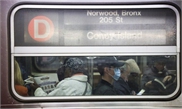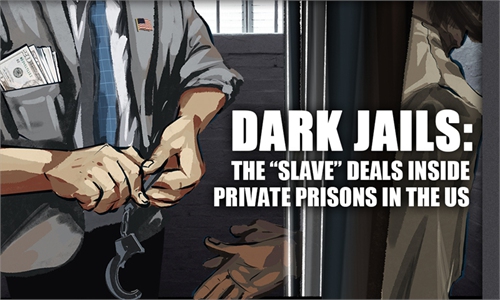GT investigates: From Guantanamo Bay to local prisons, human rights violations are pervasive in US jail system
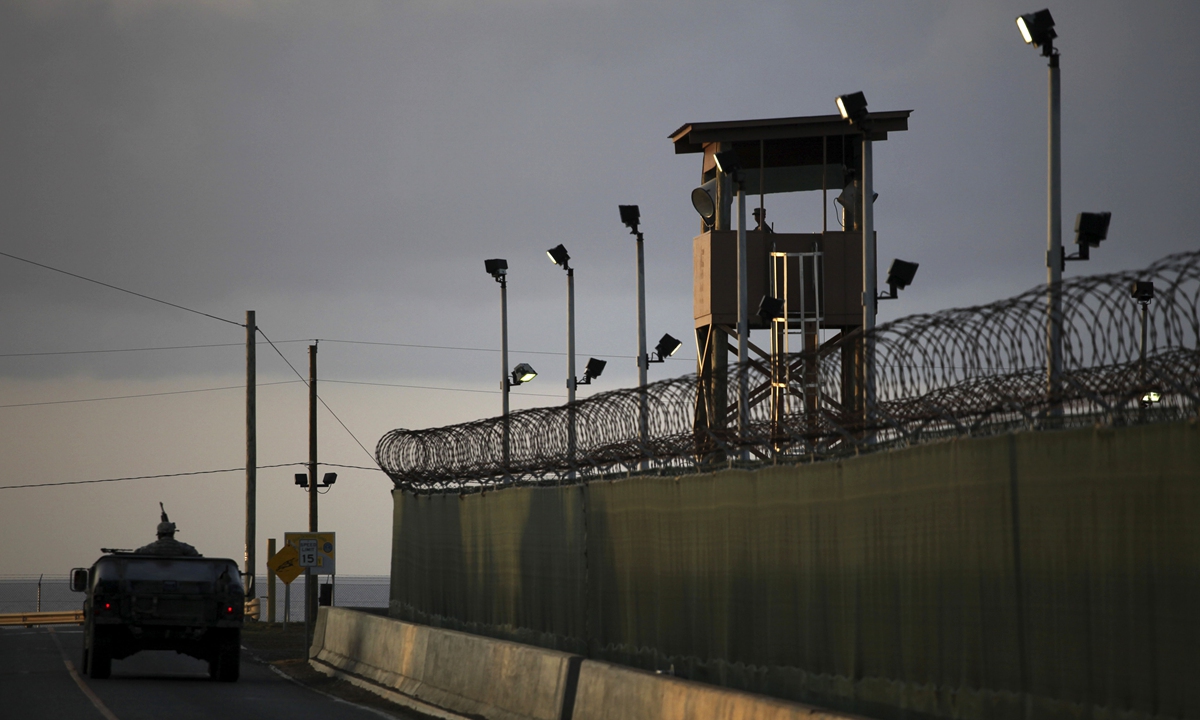
The detention facility on Guantanamo Bay US Naval Base Photo: VCG
The notorious Guantanamo Bay prison has become synonymous with the "dark prison" of the world, but it reflects only the tip of the iceberg of the US prison system's trampling on laws and human rights - behind the shady scenes are violence, abuse, sexual assault, corruption, and many other atrocities.
The American criminal justice system currently holds almost 2.3 million people in 1,833 state prisons, 110 federal prisons, 1,772 juvenile correctional facilities, 3,134 local jails, 218 immigration detention facilities, and 80 Indian Country jails as well as in military prisons, civil commitment centers, state psychiatric hospitals, and prisons in US territories, according to a 2020 report on the Prison Policy Initiative website, quoting official statistics.
Correspondingly, prisons in the US have become a huge profit-making business, while the operators behind them maintain close political affiliations.
Exposés about human rights abuses in the US are usually unseen. While there may be some coverage in the local media, once core interests are touched, the authorities step in to mute dissenting voices, Zhu Ying, a professor of human rights law at Southwest University of Political Science and Law, told the Global Times. "US' allies will also underwrite its actions because of their common interests," he said.
Numerous crimes
"When we were on hunger strike against their abuse, they would tie us to a chair and force unlubricated, hard tubes up our noses for gavage, sometimes once a day, sometimes twice a day," in an interview with the Global Times, Mansoor Adayfi from Yemen, a detainee who was held at the Guantanamo Bay Detention Camp for 14 years from 2001 to 2016, recalled the torture and abuse he suffered in this "hell on earth".
"Guantanamo prison is completely outside the law. There is no legal basis at all and it should not exist in the first place," he said.
Since 2002, about 780 detainees have been held at the American prison at Guantanamo Bay. Now, 38 remain, the New York Times reported in March. In Afghanistan, 1,700 had been detained in Parwan Detention Facility. The CIA also operates black sites in Poland and Romania.
On January 10, 2022, the 20th anniversary of the arrival of the first detainees at Guantanamo Bay Detention Camp, UN experts condemned the facility as a site of "unparalleled notoriety."
"Twenty years of practicing arbitrary detention without trial accompanied by torture or ill treatment is simply unacceptable for any government, particularly a government which has a stated claim to protecting human rights," said the independent experts, appointed by the Human Rights Council.
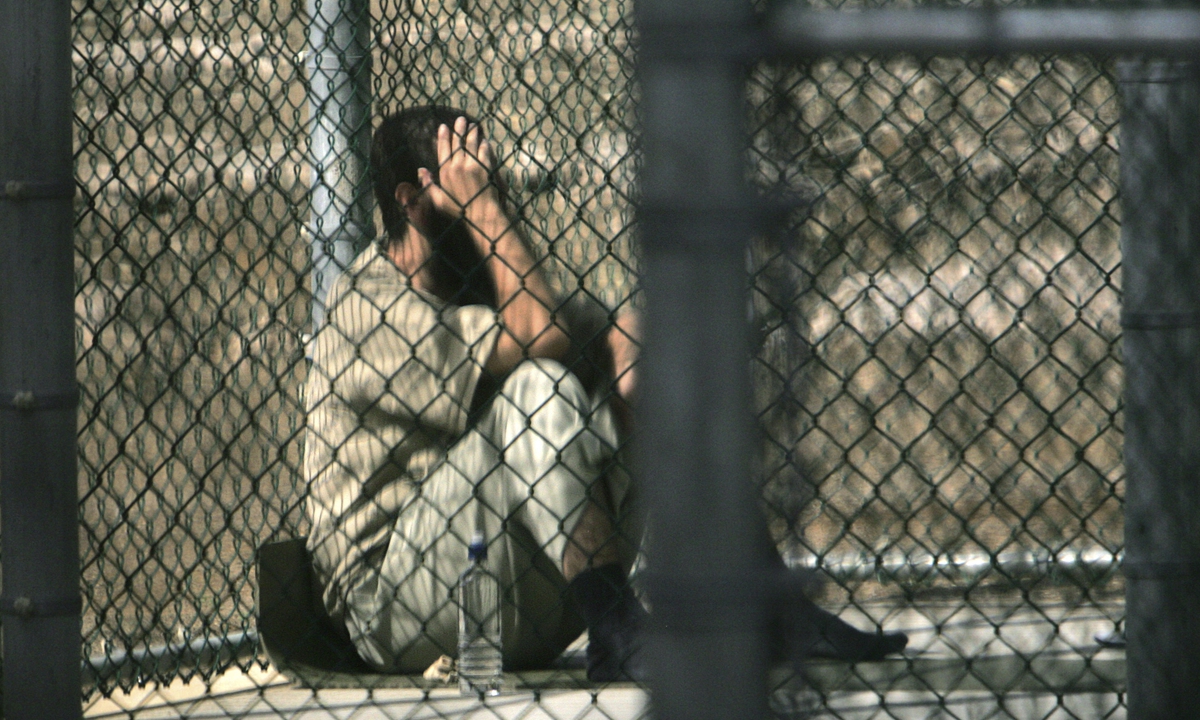
A detainee sits alone inside a fenced area during his daily outside period in Guantanamo Bay detention facility on December 5, 2006. Photo: VCG
However, in a country where imprisonment has become a common practice, the evils that take place in prisons are often ignored by American politicians and the media.In these invisible places, violence is a daily occurrence, not only among prisoners, but also when prison guards punch and kick, or even use weapons such as electric batons against the detained. The violence has caused a large number of prisoners to be injured or even killed.
According to data released by the US Bureau of Justice Statistics in 2018, 120 people were victims of homicide and 311 by suicide in US state prisons.
A Reuters report suggested that in the end of 2019, the mortality rate in these lockups jumped 8 percent in three years, and 35 percent over the decade, while "problem jails are masked by a secretive federal reporting system and scant oversight by local, state, or federal agencies."
Moreover, a staggering 200,000 people are sexually abused in prisons and jails in the US every year, a Fox's report indicated in 2020.
Torture and abuse of prisoners in the US stand in contrast to international treaties, conventions, and declarations that provide basic guidelines for the treatment of prisoners, said a report by American Friends Service Committee (AFSC).
International treaties, conventions, and declarations provide basic guidelines for the treatment of prisoners. These guidelines are often ignored by the US criminal justice system. Meanwhile, the US continues to criticize other countries for violations of prisoners' human rights, the report noted.
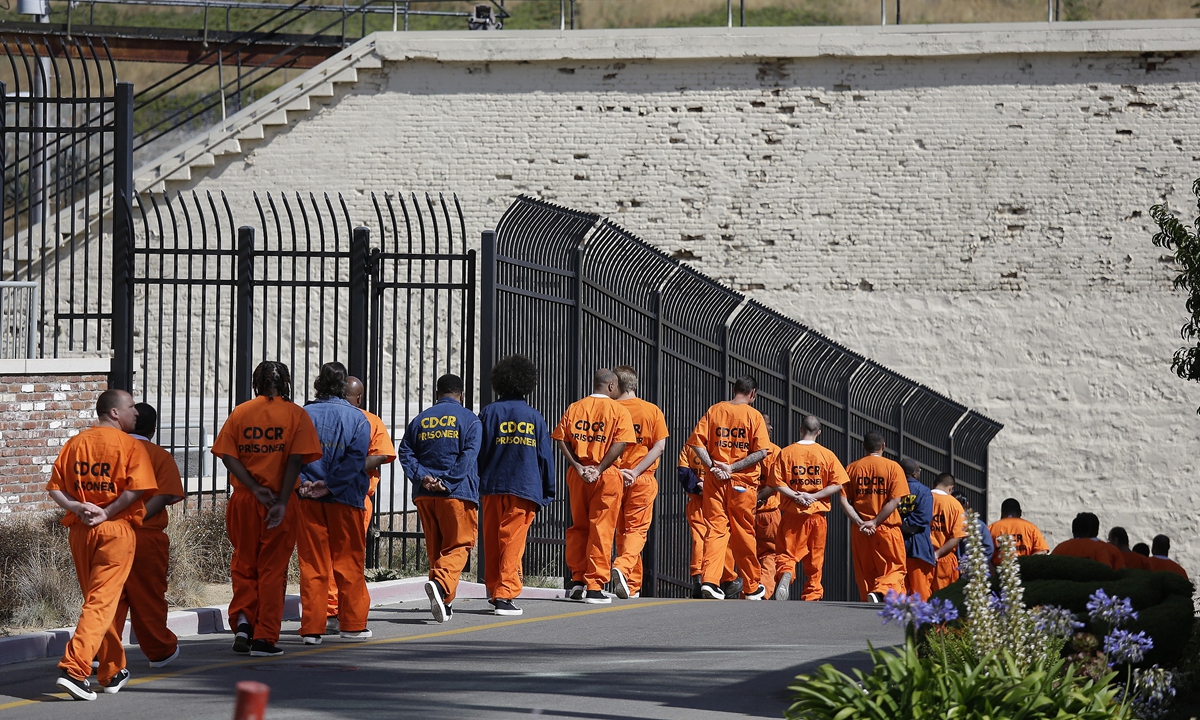
Inmates walk in a line at San Quentin State Prison in San Quentin, California on August 16, 2016. Photo: VCG
During the COVID-19 pandemic, almost 600,000 prisoners in the US have been infected, and more than 3,000 died, according to data of UCLA. "They let people die in prison that shouldn't have had to die," Shon Hopwood, a Georgetown law professor, told the Guardian.Felipe González Morales, the UN Special Rapporteur on the human rights of migrants, said in April, 2020 that UN human rights experts had received repeated reports of unsanitary conditions and lack of proper healthcare for the 1,500 detainees in the privately-run Northwest Processing Center, located in Tacoma, Washington State, US.
"We heard that there is a lack of protective measures for detainees, that it is impossible to keep the recommended physical distance, and that new arrivals are not being put into isolation for medical observation," he said.
'Kids for cash'
In 1984, The Hamilton County Penal Farm in Tennessee shifted from public to private management by the Corrections Corporation of America, becoming a historic start of the rise of private prisons.
The number of prisoners in private prisons increased by approximately 1,600 percent between 1990 and 2009, according to ACLU.
In 2019, there were about 116,000 prisoners held in privately operated facilities, representing about 7 percent of all state prisoners and 16 percent of federal prisoners, according to the Bureau of Justice Statistics.
At present, CoreCivic, formerly the Corrections Corporation of America, and GEO Group have become the two biggest giants in the private prison industry in the US.
When running a prison becomes a profitable business, inmates are no longer a life in the eyes of private prison companies, but a commodity and a "cash cow." Private prison companies in the US, under contracts with the government, receive a certain amount of money based on the number of inmates they hold on a daily basis.
According to US-based NGO RepresentUs, private prison companies employ large numbers of lobbyists in both the state and the federal government to influence lawmakers through campaign donations, to enact laws to keep private prisons at capacity at all times. For years, private prison companies have exploited America's "corrupt political system" to achieve higher incarceration rates and profit margins.
The two largest private prison companies alone have spent $35 million on lobbying and campaign contributions to state and local officials since 1989, according to RepresentUs.
The companies have also maintained a close relationship with politicians. For instance, GEO Group was "one of the top contributors" to Marco Rubio's presidential campaign between 2013 and 2014.
In 2009, the media disclosed a "political-business collusion" scandal in Luzerne county, Pennsylvania, known as the "Kids for cash" case. Two Luzerne county magistrates accepted more than $2 million in bribes from two private juvenile prison contractors. In return, from 2003 to 2008, they sent about 3,000 teenagers to private prisons to shore up the numbers. According to the New York Post, many teenagers are sent to jail for minor law violations.
More prisoners mean more cheap labor - as cheap as less than $1 a day. In the private prisons, inmates are required to work unless they are ill or disabled. Since the labor cost of private prisons is negligible, many companies and institutions actively seek to cooperate with them.
"People have said to me that the criminal justice system doesn't work. I've come to believe exactly the opposite - that it works perfectly, just as slavery did, as a matter of economic and political policy," Bonnie Kerness, an anti-racism activist who worked in University Settlement House, said.
"How is it that a 15-year-old in Newark - who the country labels worthless to the economy, who has no hope of getting a job or affording college— can suddenly generate $20,000-$30,000 a year once trapped in the criminal justice system?" She questioned.
In the US, private prisons are no longer places for punishing or reforming criminals, but places for maximizing the economic value of detainees, becoming a "black hole in national governance," Li Haidong, a professor at the Institute of International Relations of China Foreign Affairs University, told the Global Times.
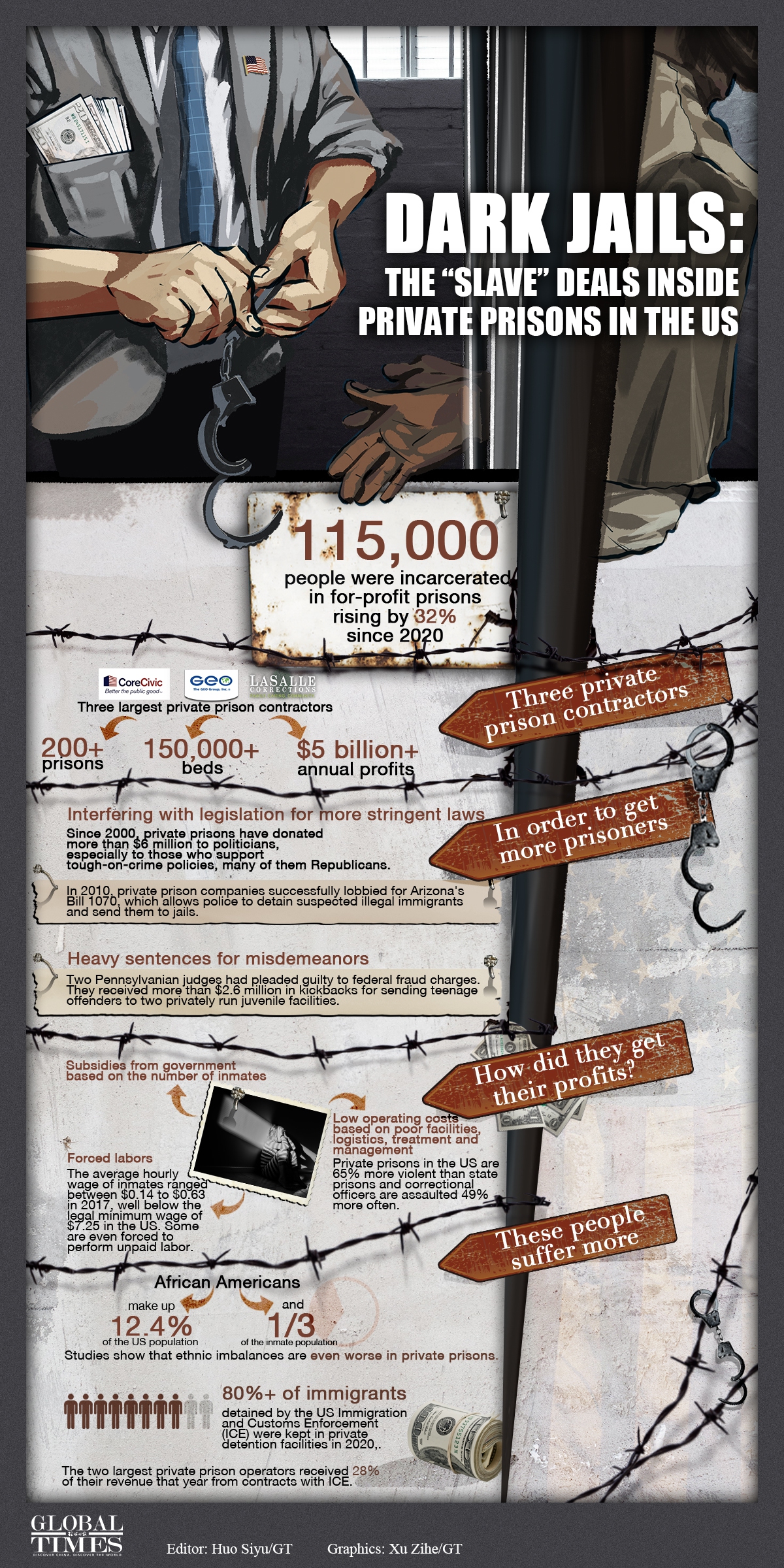
Dark Jails: the "slave" deals inside private prisons in the US.
Darkness under the light
For the US, which often claims itself to be a "beacon of human rights", prison is a place of "darkness under the light," which concentrates the US' violence based on races, genders, and other factors, as well as the hypocrisy of so-called "liberty" and "human rights".
American prisons often hunt for the poor, minorities, minors, immigrants, and other marginalized groups. For the poor, they are likely to be detained because they cannot pay bail, and are eventually compelled to plead guilty under duress, and are often unable to comply with the harsh requirements attached to fines or probation.
"A culture of punishment, combined with race- and class-based animus, has led the US to rely on incarceration more heavily than any other country in the world does," concluded ACLU on its website.
The social operation of the US relies on economic promotion and profit dominance, but when the same principle is followed by running prisons, it could only cause a great deal of tragedies, Li said. "This not only reflects the existence of systemic human rights problems in the US, but also reflects the degeneration of social ethics and morality."
